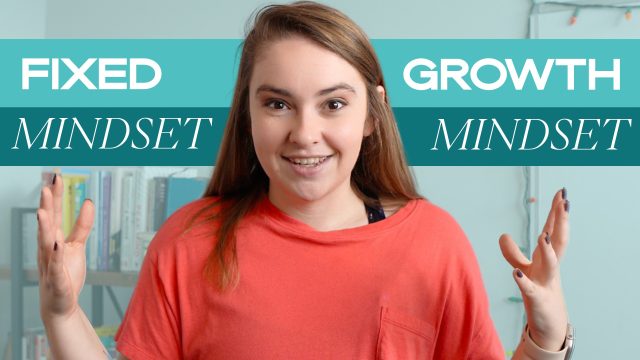“I’m just not the type of person who can _________.”
If you have ever said this phrase, this post is going to be a little bit of a gut check because that is a sign that you might have a fixed mindset vs. growth mindset.
Hi, my name is Dr. Karin Nordin and I am an expert in growth mindset. I’ve published several articles on it and I have a Ph.D. focused on health communication; this is really my bread and butter. It’s something that a lot of people really misunderstand, which stops them from becoming the person they want to be and achieving their goals.
In this post, I’m going to give an overview on what a growth mindset actually is — because you might have it wrong. Then we’ll talk about signs that you might have a growth mindset or a fixed mindset so that you can make the shift to fix it in a meaningful, sustainable way.
What Is A Growth Mindset?
First, let’s talk about what a growth mindset is. Now, there’s a big misconception out there that having a growth mindset is kind of like having a positive attitude. That growth mindset is believing that you can do it, but scientifically, that’s not accurate at all. In fact, a growth mindset is a very specific belief that a specific skill or quality in your life can be improved and changed with effort.
A growth mindset is the belief that a specific skill or quality can be improved and changed with effort.
What Is A Fixed Mindset?
A fixed mindset is exactly the opposite — when you believe that your skills and qualities are not changeable, no matter the effort you put forth. It doesn’t mean you have a negative attitude, just an immovable (hence, fixed) viewpoint.
A fixed mindset is the belief that specific skills and qualities are fixed and unchangeable.
Let’s use sleep as an example, and let’s say that you sleep pretty poorly.
You might have a fixed mindset if you say, Meh, genetically, I’m kind of screwed. Sleep is no good for anyone in my family. That’s just the way it is for us. It’s not something that can be changed.
You might have a growth mindset if you say, Historically, sleep has been something that I’ve struggled with, but I’m sure with effort and a little bit of knowledge, I can at least improve it.
Why does mindset matter?
Here’s the deal. If you don’t believe that you can change something about yourself, if you don’t believe that a particular quality can be improved, OF COURSE you’re going to have difficulty with any goal that relates to that quality! Every time you hit a setback or an obstacle, you’re going to want to give up because ultimately, deep down inside, you don’t believe in your ability to change.
Let’s talk about three different signs that you might have a fixed mindset and what you can do about it.
1. Obstacle Upset
Sign number one is exactly what I just talked about. You get super upset every single time you hit an obstacle. This is also if you have the screw it mentality. So let’s pretend, for example, that you’re trying to engage in intentional weight loss, but every time you don’t hit your calories or you don’t hit your macros for the day, you’re like, well, I can’t do it anyway. Then you spend several days going totally rogue, eating whatever you want, blowing past your calories, et cetera, et cetera.
This is an example of a fixed mindset. You don’t believe that you can improve the skill of controlling what you’re putting in your body. As a result, when something reinforces that belief, you blow up, you give up, and you want to be as far away from it as possible.
Shift towards a growth mindset
Instead of viewing obstacles as something that mean you can’t get to your goal, I want you to anticipate obstacles and write them in as part of your strategy. In the example we just talked about, that might look like saying, if I have trouble with my macros on Saturday, then on Sunday morning, I will reach out to my coach and make a plan for hitting them that day.
This if-then statement is something that is really easy to do and it’s a really concrete tactic you can practice. In fact, I would encourage you to practice it right now. Go ahead and anticipate an obstacle you might face in the next 48 hours that’s going to stop you from doing something that you want to do. If that obstacle happens, what plan are you going to enact? What are you going to do about it? Go ahead and write that in the comments and I will reply and let you know if you’re on the right track.
2. Obsessed with Outcome
Sign number two that you might be struggling with a fixed mindset is if you are obsessed with your performance or your outcome. Let’s use a different example. Let’s pretend that you are working on hitting 10,000 steps a day and moving more often in your life. If you get super, super upset when you don’t hit that 10,000 steps, or if you’re incredibly focused on hitting that 10,000 steps every single day, so much so that it’s causing you anxiety and distress, that might be a sign that you’re experiencing a fixed mindset.
The reason is you’re not giving yourself room to grow. You’re not giving yourself room to improve and become 1%, 2%, 3%, 4% better at that thing.
Shift towards a growth mindset
Identify where you want to be, where you are right now, and recognize that there’s probably a pretty big gap. Maybe right now you’re getting 3,000 steps a day but you want to be getting 10,000 steps a day and you’re really frustrated that you just can’t nail that. Instead of trying to make the jump all the way to 10k at once, identify just what one small step could be.
What does it look like to get 1% better at the things you want to do? This is called a mastery focus. It’s the opposite of the performance focus that is so common in people who have a fixed mindset vs growth mindset, and it can make a huge difference in the success of your goals.
3. Focus on Avoidance
You might have a fixed mindset if you’re focused on stopping or avoiding something — especially through sheer willpower — rather than improving a skill or moving towards a larger goal.
Let’s say, for example, that you’re trying to stop scrolling on your phone so much. You’re trying to get rid of your TikTok obsession. That’s a phrase I hear a lot. If that’s the case, you might believe that you have to power through, or you just need to make the decision to stop scrolling.
Shift towards a growth mindset
Instead, ask yourself, What goal am I moving towards for all that time I’m currently spending scrolling this app? What do I actually want to be doing with that time and how can I get one step closer?
Fixed mindset versus growth mindset is a well-researched subject that has been studied since about the 1980s (which is a long time for psychology). Shifting from a fixed to a growth mindset has been proven to help people achieve their goals. Now, the science behind growth and fixed mindset is pretty complicated, so I will be touching on it even more in future videos. Make sure you check my blog and my YouTube channel weekly if you want further education on fixed mindset vs growth mindset.
In the meantime, we do offer a coaching program, so if you’re looking for a one-on-one coach who will help you stay accountable towards the goals that you’ve set, make sure you check out Alliance Coaching. See you next week!




